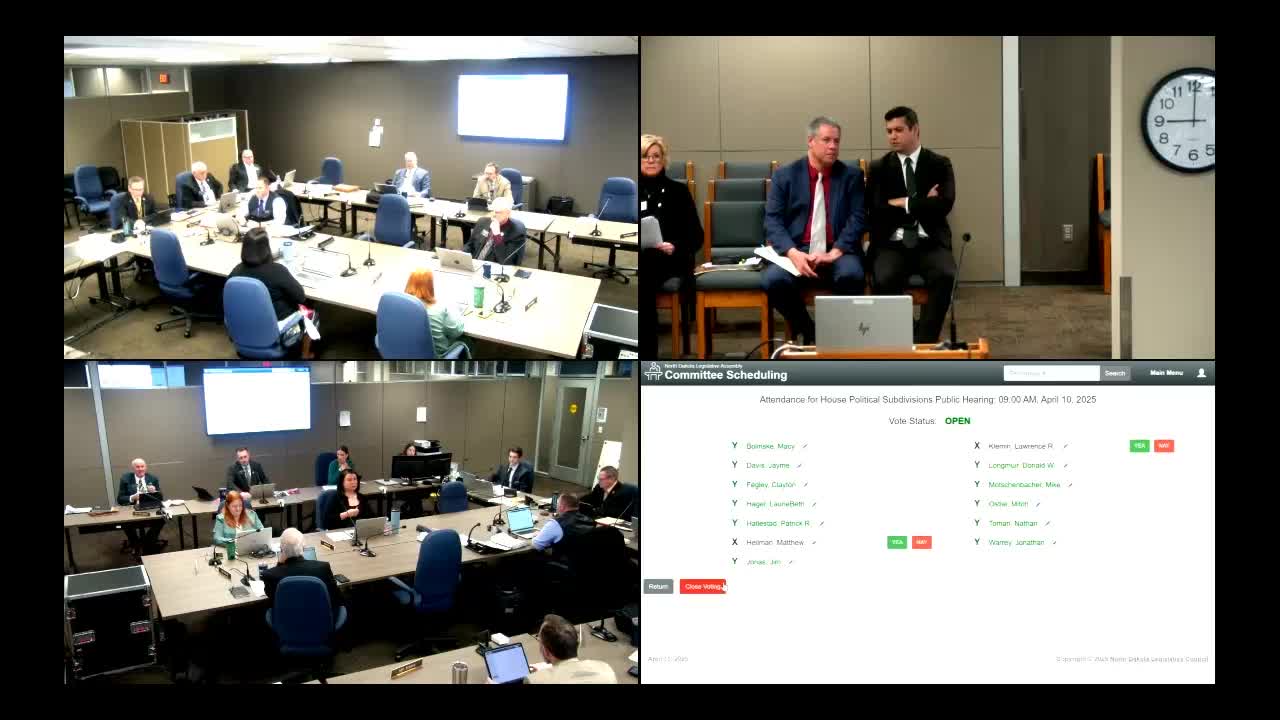Political Subdivisions Committee narrows notice requirement, gives Senate Bill 2069 a "do pass"
Get AI-powered insights, summaries, and transcripts
Subscribe
Summary
The committee voted 11-0, with two members absent, to reconsider Senate Bill 2069, approve an amendment that narrows a publication requirement to state agencies, and recommend the bill for passage to the next stage.
The Political Subdivisions Committee voted to reconsider and recommend Senate Bill 2069 after approving an amendment that limits a new publication requirement to state agencies, committee members said.
The committee met (date not specified) and voted to bring back Senate Bill 2,069 for reconsideration, accept an amendment to Section 2 that narrows the list of entities covered, and moved a "do pass" recommendation. The amendment passed 11-0 with two members absent; the final committee vote on the bill as amended was also 11-0 with two absent.
Representative Moshenbacher, who moved to reconsider the bill, said the change to Section 2 was made after the committee was told the original language would have required thousands of affidavits and would have exceeded the capacity of the state newspaper association. "It was made aware to us that the amount of affidavits that would have had to have been sent out were in the thousands and it would have just been beyond the capability of the newspaper association to do so," Moshenbacher said, explaining the amendment narrows the requirement from "all governmental units" to just state agencies.
Cecile Wurman, executive director of the North Dakota Newspaper Association, told the committee the association's intent is to publish ordered legal notices on its website before or at the same time the notice goes to print. "Our intention is that when we receive an order for a print notice, we will publish that on the website before it even goes to print literally," Wurman said.
Jack McDonald, also speaking for the newspaper association, said the word "immediate" in the amendment allows agencies to request that a notice be posted online right away so that a missed print publication would not prevent timely public access. "So that's why the word immediate is on there so they can ask for it and put it up there immediately even before the newspaper publishes," McDonald said.
Representative Haber asked whether a statutory 30-day notice period would begin on the date a notice appears online or the date it appears in print. A committee member replied that "the clock starts the minute it's published on the website," a point committee members cited as a reason for the explicit online publication language.
The committee adopted the amendment, then approved a motion for a "do pass" recommendation on Senate Bill 2069 as amended. Representative Bosley moved the "do pass" motion; Representative Paddlestick seconded. The clerk recorded the amendment vote as 11 yea, 0 nay, 2 absent (not voting), and the final committee vote on the bill as amended as 11 yea, 0 nay, 2 absent (not voting).
Chairman Longmeir said the changes made on the House side likely mean the measure will go to a conference committee because of differences between House and Senate versions. Representative Moshenbacher agreed to carry the bill beyond committee.
Votes at a glance: Amendment to Senate Bill 2069 — passed 11-0, 2 absent. Final committee recommendation on Senate Bill 2069 as amended — "do pass" 11-0, 2 absent.
The session also included brief administrative remarks about a committee dinner scheduled for next Thursday; no further policy actions on other items were recorded.
